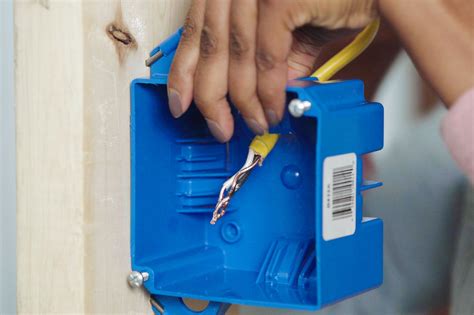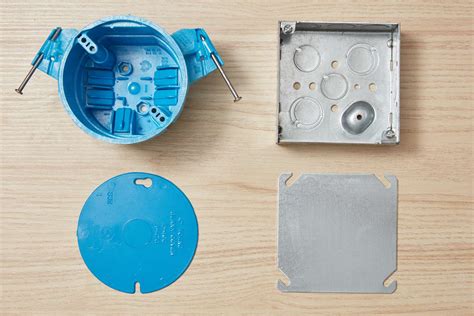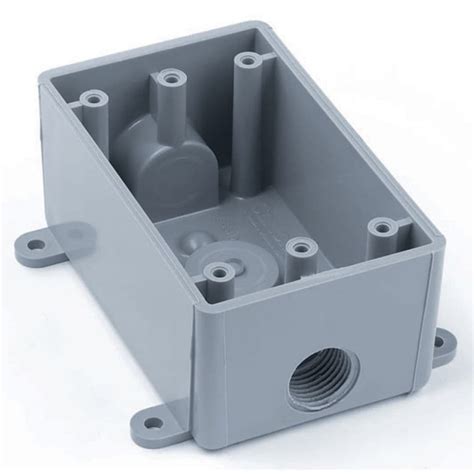electrical boxes metal or plastic Metal boxes are a good choice for high-current applications, while plastic boxes are more suitable for corrosive or damp environments. Plastic electrical boxes are the most common type of . Join thousands of roofing contractors today and start shopping online with Roof Hub. Your online store open 24/7 to take your orders!
0 · wiring plastic electrical box knockouts
1 · plastic outlet box vs metal
2 · plastic junction boxes electrical lowe's
3 · plastic electrical outlet boxes types
4 · metal vs pvc junction box
5 · metal vs plastic gang box
6 · installing a plastic electrical box
7 · exterior electrical outlet box
i am installing new to me twin Yamaha 70 Beto outboards 1992 ( I think) to my refurbished boat. I am wondering what and how this junction box is installed if at all. My last .
Use a metal electrical box when metal-sheathed cable (also called armored BX cable) or metal conduit runs in or out of the box. Metal cable and conduit depend on the contact from its metal sheathing to the metal box to .

incredibles metal lunch box
Plastic boxes are the most common choice for residential wiring projects. They are lightweight, easy to install, and less expensive than metal . Metal and plastic are the most common materials used to construct electrical boxes. Metal boxes are primarily made from steel, aluminum, or cast .Metal boxes are a good choice for high-current applications, while plastic boxes are more suitable for corrosive or damp environments. Plastic electrical boxes are the most common type of .

wiring plastic electrical box knockouts
Use a metal electrical box when metal-sheathed cable (also called armored BX cable) or metal conduit runs in or out of the box. Metal cable and conduit depend on the contact from its metal sheathing to the metal box to complete grounding. Electrical boxes are nearly always made from a metal or plastic material. Specifically, aluminum, steel, or cast iron are usually used for metal covers. Plastic boxes are usually PVC or fiberglass.
Plastic boxes are the most common choice for residential wiring projects. They are lightweight, easy to install, and less expensive than metal options. Plastic boxes are also non-conductive, reducing the risk of electrical shock, and they’re compatible with . Metal and plastic are the most common materials used to construct electrical boxes. Metal boxes are primarily made from steel, aluminum, or cast iron, while non-metallic boxes use PVC or fiberglass. Is it beneficial to replace the metal electric box with plastic?Metal boxes are a good choice for high-current applications, while plastic boxes are more suitable for corrosive or damp environments. Plastic electrical boxes are the most common type of electrical box. They are made from a variety of materials, including PVC, . Most electrical boxes are either metal or plastic. Metal boxes are generally steel, while plastic boxes are PVC or fiberglass. Metal Electrical Boxes . Metal electrical boxes are best for metal-sheathed cable or metal conduit. Weatherproof metal boxes for outdoor use are generally made of aluminum. Capable of being grounded; Durable; Fireproof .
plastic outlet box vs metal
plastic junction boxes electrical lowe's
Now, let's dive into the comparison between plastic and metal electrical boxes to determine which one is best suited for your specific wiring needs. Plastic Electrical Boxes. Plastic (usually PVC) electrical boxes have become the standard choice, especially for do-it-yourself (DIY) enthusiasts.

When it comes to electrical installations, the choice between a metal or plastic junction box depends on the unique requirements of your project. Plastic boxes are cost-effective and lightweight. They are widely used for standard residential and low-voltage applications.
That’s why it’s essential to understand the two main types of junction boxes: plastic and metal. Each has its advantages. Plastic boxes are lightweight and easy to install, perfect for most residential homes. On the other hand, metal boxes are .
Most do-it-yourselfers prefer plastic electrical boxes, while electricians use both metal and plastic boxes. Metal electrical boxes were used long before plastic (PVC) electrical boxes were introduced to the market. Use a metal electrical box when metal-sheathed cable (also called armored BX cable) or metal conduit runs in or out of the box. Metal cable and conduit depend on the contact from its metal sheathing to the metal box to complete grounding. Electrical boxes are nearly always made from a metal or plastic material. Specifically, aluminum, steel, or cast iron are usually used for metal covers. Plastic boxes are usually PVC or fiberglass. Plastic boxes are the most common choice for residential wiring projects. They are lightweight, easy to install, and less expensive than metal options. Plastic boxes are also non-conductive, reducing the risk of electrical shock, and they’re compatible with .
Metal and plastic are the most common materials used to construct electrical boxes. Metal boxes are primarily made from steel, aluminum, or cast iron, while non-metallic boxes use PVC or fiberglass. Is it beneficial to replace the metal electric box with plastic?Metal boxes are a good choice for high-current applications, while plastic boxes are more suitable for corrosive or damp environments. Plastic electrical boxes are the most common type of electrical box. They are made from a variety of materials, including PVC, .
Most electrical boxes are either metal or plastic. Metal boxes are generally steel, while plastic boxes are PVC or fiberglass. Metal Electrical Boxes . Metal electrical boxes are best for metal-sheathed cable or metal conduit. Weatherproof metal boxes for outdoor use are generally made of aluminum. Capable of being grounded; Durable; Fireproof . Now, let's dive into the comparison between plastic and metal electrical boxes to determine which one is best suited for your specific wiring needs. Plastic Electrical Boxes. Plastic (usually PVC) electrical boxes have become the standard choice, especially for do-it-yourself (DIY) enthusiasts.
When it comes to electrical installations, the choice between a metal or plastic junction box depends on the unique requirements of your project. Plastic boxes are cost-effective and lightweight. They are widely used for standard residential and low-voltage applications. That’s why it’s essential to understand the two main types of junction boxes: plastic and metal. Each has its advantages. Plastic boxes are lightweight and easy to install, perfect for most residential homes. On the other hand, metal boxes are .
plastic electrical outlet boxes types
metal vs pvc junction box
Epoxy adhesive is a versatile and durable option suitable for bonding metal to fabric. Polyurethane adhesive provides flexibility and resilience, making it ideal for applications with movement or stress. Cyanoacrylate .
electrical boxes metal or plastic|plastic electrical outlet boxes types